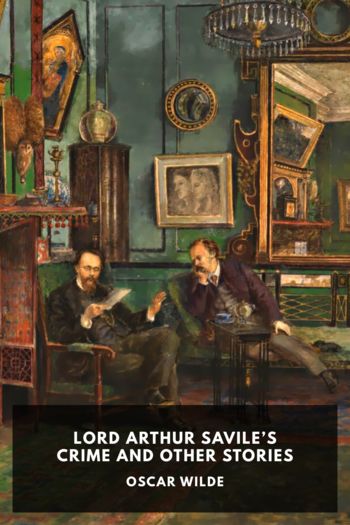Children’s Stories by Oscar Wilde (motivational books to read .TXT) 📕

- Author: Oscar Wilde
Book online «Children’s Stories by Oscar Wilde (motivational books to read .TXT) 📕». Author Oscar Wilde
As for the old Sundial, who was an extremely remarkable individual, and had once told the time of day to no less a person than the Emperor Charles V himself, he was so taken aback by the little Dwarf’s appearance, that he almost forgot to mark two whole minutes with his long shadowy finger, and could not help saying to the great milk-white Peacock, who was sunning herself on the balustrade, that everyone knew that the children of Kings were Kings, and that the children of charcoal-burners were charcoal-burners, and that it was absurd to pretend that it wasn’t so; a statement with which the Peacock entirely agreed, and indeed screamed out, “Certainly, certainly,” in such a loud, harsh voice, that the goldfish who lived in the basin of the cool splashing fountain put their heads out of the water, and asked the huge stone Tritons what on earth was the matter.
But somehow the Birds liked him. They had seen him often in the forest, dancing about like an elf after the eddying leaves, or crouched up in the hollow of some old oak-tree, sharing his nuts with the squirrels. They did not mind his being ugly, a bit. Why, even the nightingale herself, who sang so sweetly in the orange groves at night that sometimes the Moon leaned down to listen, was not much to look at after all; and, besides, he had been kind to them, and during that terribly bitter winter, when there were no berries on the trees, and the ground was as hard as iron, and the wolves had come down to the very gates of the city to look for food, he had never once forgotten them, but had always given them crumbs out of his little hunch of black bread, and divided with them whatever poor breakfast he had.
So they flew round and round him, just touching his cheek with their wings as they passed, and chattered to each other, and the little Dwarf was so pleased that he could not help showing them the beautiful white rose, and telling them that the Infanta herself had given it to him because she loved him.
They did not understand a single word of what he was saying, but that made no matter, for they put their heads on one side, and looked wise, which is quite as good as understanding a thing, and very much easier.
The Lizards also took an immense fancy to him, and when he grew tired of running about and flung himself down on the grass to rest, they played and romped all over him, and tried to amuse him in the best way they could. “Everyone cannot be as beautiful as a lizard,” they cried; “that would be too much to expect. And, though it sounds absurd to say so, he is really not so ugly after all, provided, of course, that one shuts one’s eyes, and does not look at him.” The Lizards were extremely philosophical by nature, and often sat thinking for hours and hours together, when there was nothing else to do, or when the weather was too rainy for them to go out.
The Flowers, however, were excessively annoyed at their behaviour, and at the behaviour of the birds. “It only shows,” they said, “what a vulgarising effect this incessant rushing and flying about has. Well-bred people always stay exactly in the same place, as we do. No one ever saw us hopping up and down the walks, or galloping madly through the grass after dragonflies. When we do want change of air, we send for the gardener, and he carries us to another bed. This is dignified, and as it should be. But birds and lizards have no sense of repose, and indeed birds have not even a permanent address. They are mere vagrants like the gipsies, and should be treated in exactly the same manner.” So they put their noses in the air, and looked very haughty, and were quite delighted when after some time they saw the little Dwarf scramble up from the grass, and make his way across the terrace to the palace.
“He should certainly be kept indoors for the rest of his natural life,” they said. “Look at his hunched back, and his crooked legs,” and they began to titter.
But the little Dwarf knew nothing of all this. He liked the birds and the lizards immensely, and thought that the flowers were the most marvellous things in the whole world, except of course the Infanta, but then she had given him the beautiful white rose, and she loved him, and that made a great difference. How he wished that he had gone back with her! She would have put him on her right hand, and smiled at him, and he would have never left her side, but would have made her his playmate, and taught her all kinds of delightful tricks. For though he had never been in a palace before, he knew a great many wonderful things. He could make little cages out of rushes for the grasshoppers to sing in, and fashion the long jointed bamboo into the pipe that Pan loves to hear. He knew the cry of every bird, and could call the starlings from the treetop, or the heron from the mere. He knew the trail of every animal, and could track the hare by its delicate footprints, and the boar by the trampled leaves. All the wild-dances he knew, the mad dance in red raiment with the





Comments (0)